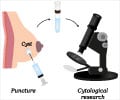Women diagnosed with breast cancer caused by the notorious BRCA gene mutation have a much better chance of survival if they have both breasts removed instead of one, reveals a study.

This compares to 66 of every 100 who opt for a single amputation, according to the research published in the British Medical Journal (BMJ).
"We conclude that it is reasonable to propose bilateral mastectomy as the initial treatment option for women with early-stage breast cancer who are carriers of a BRCA1 or BRCA2 mutation," the authors wrote.
For those who have had one breast removed, "the possibility of a second surgery should be discussed," they advised.
Breast cancer has multiple sources, but the best-known inherited causes are the so-called BRCA1 or BCRA2 (for BReast CAncer susceptibility) genes that carry telltale mutations.
About 0.2 percent of women carry a harmful variant of these genes.
Advertisement
The mastectomy question was thrown into the spotlight last year when Hollywood star Angelina Jolie announced she had both breasts surgically removed as a preventative measure after tests revealed she carried the BRCA mutation. She had not been diagnosed with the disease.
Advertisement
There were some 521,000 breast cancer deaths in 2012, according to the World Health Organisation (WHO). It is the most common type of cancer among women.
For the study, specialists in Canada and the United States compared the survival rates of 390 women diagnosed with early-stage breast cancer between 1975 and 2009.
They were all known carriers or likely carriers of a mutation in the BRCA1 or BRCA2 gene.
Of the group, 79 women died in the follow-up period -- 18 of them had had a double mastectomy and 61 a single one.
"Having both breasts removed was associated with a significant (48 percent) reduction in breast cancer death compared with having only one breast removed over a 20 year period," said a statement.
The study said half of women in North America with a BRCA mutation opt for a double breast removal to prevent a second cancer.
- Do mammograms help? -
Another study in the same journal, meanwhile, cast doubt on the value of annual mammogram screening of women aged 40 to 59.
It is the latest evidence in a long-running debate about the usefulness of a costly procedure that sometimes results in over-diagnosis -- the discovery (and treatment) of cancers that would never have caused symptoms or death during a woman's lifetime.
Analysing the results of a 25-year Canadian study with nearly 90,000 women, researchers said mammograms were no more effective at preventing cancer deaths than physical breast examination.
A total of 3,250 women who received annual mammograms, and 3,133 who did not, were diagnosed with breast cancer during the study period, and 500 and 505 in each group died, said the study.
Women in both groups had regular physical breast examinations.
"The cumulative mortality from breast cancer was similar" between the two groups, said the authors.
Annual mammography "does not result in a reduction in breast cancer mortality for women aged 40-59", the team wrote.
"The rationale for screening by mammography should be urgently reassessed by policymakers."
Source-AFP















